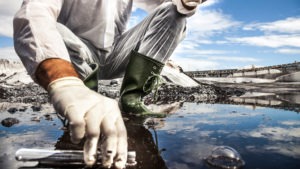For more than 30 years, harmful, colorless toxins contaminated the drinking water at Camp Lejeune in North Carolina. Exposure to these chemicals has resulted in generations facing severe medical issues, many of which proved fatal.
It is worth noting that not every person exposed to the water at Camp Lejeune experienced the same symptoms or illnesses. However, victims have filed several Camp Lejeune water contamination lawsuits thanks to the enactment of the Honoring Our PACT Act of 2022. These lawsuits could hold the federal government accountable for the toxins in the water at Camp Lejeune.
Contaminants in the Water at Camp Lejeune
Despite years of complaints regarding the water quality at Camp Lejeune, chemical testing only began in earnest in the mid-1980s. These tests discovered what volatile organic compounds (VOCs) were in the water that no one had documented previously.
Since then, the Department of Veterans Affairs (VA) has warned of the health risks associated with exposure to these chemicals. These are some of the prominent contaminants found in the water at Camp Lejeune.
Benzene
Benzene is a commonly used chemical that occurs naturally, but it is also one of the most widely produced chemicals in the United States. This substance is used to make a number of products like plastics and resins. It is also present in other substances, like dyes, detergents, and lubricants.
Many experts attribute its presence in the water at Camp Lejeune to be at least partially related to the toxic chemicals released into the water supply by a nearby laundromat. Scientists link exposure to leukemia as well as non-Hodgkin’s lymphoma.
Perchloroethylene (PCE)
Perchloroethylene is one of the substances most commonly linked to health issues at Camp Lejeune. This substance was primarily used as a dry-cleaning solvent. However, it was the primary contaminant for at least one of the water supply systems at Camp Lejeune.
VA believes the same laundromat that poured benzene into rainwater runoff also introduced PCE into the water supply. This dry-cleaning business opened in 1953, which tracks with the timeline for contamination. However, other potential entities could have contributed PCE to the water system, including burn sites, an on-base dry cleaner, and the location of the original base dump.
PCE has been linked to an array of severe health issues over the years. For example, PCE is a known carcinogen commonly linked to bladder cancers.
Trichloroethylene (TCE)
Trichloroethylene is another substance found in Camp Lejeune’s water supply. TCE is a colorless chemical that does not occur naturally. It is a known carcinogen, and extended exposure to TCE can have lasting—even fatal—health consequences, including kidney cancers, non-Hodgkin’s lymphoma, and heart issues.
TCE is commonly used as a solvent for removing grease from metal. However, it is also frequently used to remove paint and manufacture adhesives and typewriter correction fluids.
The exact source of TCE in Camp Lejeune is unknown. Potential sources include industrial waste dumping and chemical spills that occurred decades before testing began, so it is impossible to know exactly how toxic the water at Camp Lejeune was from the mid-1950s onward.
For a free legal consultation, call (725) 900-9000
How Were These Substances Absorbed Into Camp Lejeune’s Water System?
Camp Lejeune could have come into contact with contaminated water in many ways. For example, servicemembers stationed or working at Camp Lejeune could have suffered exposure doing everyday activities with families and loved ones, including:
- Bathing
- Drinking
- Cooking
- Washing dishes
- Laundry
The harmful chemicals were both colorless and odorless, making it impossible to detect them without careful testing. Widespread contamination resulted in service members suffering more than 30 years of exposure that led to myriad health issues and hardship—not only for those who lived and worked there, but also for the generations that followed them.
Talk to an Attorney About Your Camp Lejeune Claim
The toxins in the water at Camp Lejeune represent a serious health risk to multiple generations of servicemembers and their families. Additionally, countless individuals now struggle with issues ranging from cancer to cardiac problems due to this toxic exposure.
If you or a loved one face health challenges after exposure to the water at Camp Lejeune, now is the time to consult legal counsel and seek the compensation you need to cover mounting medical bills, lost income, and other damages. Contact Van Law today for your free consultation.
No obligation consultations are always free.
Let Us Help You! Call Now: (725) 900-9000Client Testimonials
Related Videos















